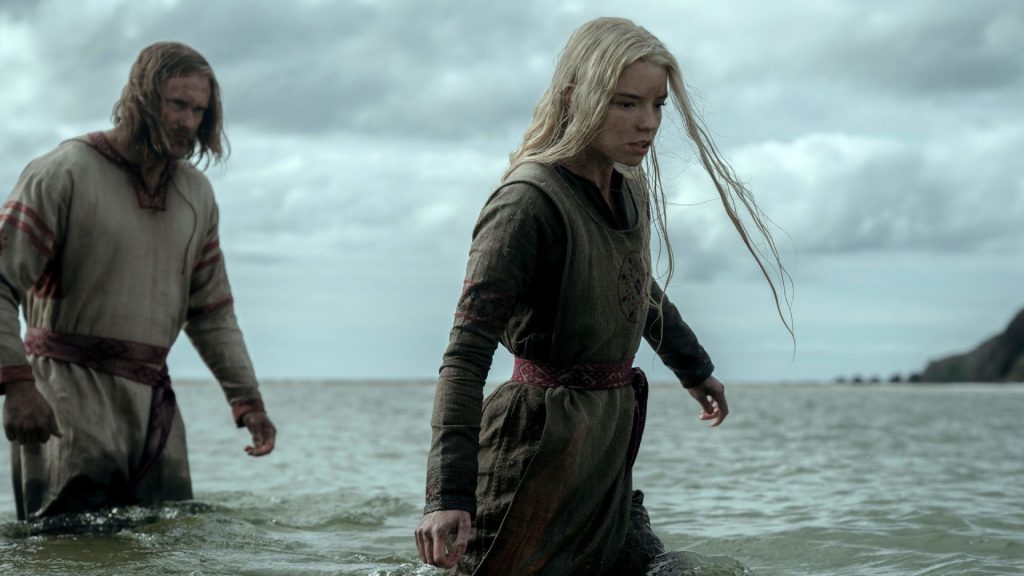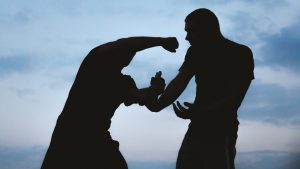In one of the early scenes in the new movie The Northman, the exiled Viking king Fjölnir (played by Claes Bang) teaches his young son Gunnar how to put up fences around the family farm in rural Iceland.
The young prince looks around at the family’s slaves milling about the farm, and quizzically asks his father why they should have to do any manual labor.
“We don’t know if we’ll spend next winter as a king or a slave,” Fjölnir tells his son.
“It’s best to be prepared for both.”
This quiet scene between the would-be villain of The Northman and his offspring nicely encapsulates some of the film’s deeper themes, which relate to adapting to unexpected change, coming to terms with fate, and finding your own way in life.
The hero of The Northman is the Danish prince Amleth, played as an adult by Alexander Skarsgård. He has vowed revenge on his uncle after Fjölnir murdered his father, stole his mother for his own wife, and robbed him of his future.
Amleth manages to escape his uncle’s wrath, and grows up in the company of berserkers, uncompromisingly violent Vikings who raid and pillage villages throughout Europe.
Cows die, family die,
you will die the same way.
But a good reputation
never dies for the one
who earns it well.Hávamál (The Poetic Edda)
In one of The Northman’s more memorable sequences, Amleth and his fellow berserkers howl at the moon like dogs during a Viking ritual before battle. Tapping into their animalistic nature, the berserkers are able to commence their attack with all traces of humanity, a potential weakness, stripped away.
Skarsgård’s Amleth walks through The Northman in a trance-like state, his mind focused solely on revenge. And he knows what his fate will bring him: he has seen his future through the aid of a mystical shaman, who tells him of a lake of fire upon which he will slay his uncle with a mystical sword.
Amleth ends up on Fjölnir’s family farm in Iceland surprisingly early on in The Northman, disguised as a slave in his uncle’s service. And he even obtains the mystical sword. But there’s no lake of fire in sight.
And Amleth, for perhaps the first time, realizes that while his ultimate fate has been predetermined, the path he chooses to get there is entirely his own. We, too, can take inspiration from this principle rooted in Viking philosophy.
NEW! Put the principles from this article into practice with the free courage-boosting MaArtial app on the App Store for iOs and Play Store for Android.
Authenticity seeps throughout The Northman. Sets created for the film were made with period-era materials, and approved by Viking historians. And the script, by director Robert Eggers and Icelandic poet Sjón, is well-researched and richly evokes themes from classic Viking texts.
Among those is The Poetic Edda, a collection of anonymously-authored Viking poems from the 13th century that are one of the primary sources for what we know about Norse mythology today. It has recently been translated by Old Norse scholar Jackson Crawford.
The Poetic Edda includes Hávamál, a poem presented as advice from Odin himself on how we should live and conduct ourselves.
Do not be so sparing
in using your money
that you don’t use it for your own needs.
Often what you save for your children
will end up in the hands of your enemies—
many things will go worse than you expect.Hávamál (The Poetic Edda)
Themes of adapting to change, finding your own path in life, and living in the moment are not unique to the Vikings.
“You must understand that there is more than one path to the top of the mountain,” Japanese swordsman Miyamoto Musashi wrote in The Book of Five Rings. The philosophy can be dated back thousands of years earlier, to the Greek and Roman Stoics who meditated on death to cultivate appreciation for life.
And these principles are just as relevant today as they were during the times of the Stoics, Vikings, or samurai.
We are each born with innate knowledge of our ultimate fate. But how we choose to get there is entirely up to us.












